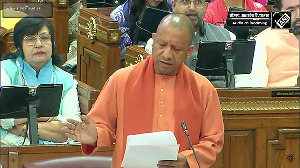The Mumbai International Marathon was truly an international event. So much so that the runners from the Services Sports Control Board who emerged best among the Indians were not even offered a bottle of water after the race.
Thus, the first five of them had reason to be upset with the organisers.
K C Ramu, the first Indian to complete the full marathon, said the organizers informed them about the marathon only a month back.
"If we were informed about the event at least three months earlier we would have trained better and achieved a better timing," he said, searching for a bottle of water, which was a rare commodity in the Elite Participants' Tent, where urine samples of the first three placers were being taken for dope testing.
Ramu said his Cuban coach at the Army Sports Institute in Pune put a programme in place to ensure the athletes achieve their target of 2 hours, 20 minutes.
"I will prepare for 2.15 next year," he promised as he finally got his bottle of water.
Captain Prabhu Dayal Kherwal, the Services' Talent Spotting Officer, said that the organisers should have at least allowed the athletes to train for a month on the same route.
"But, I guess, the Indian mentality is to cater to foreigners and ignore the Indian athlete," he added.
Captain MS Gill, the Services sports psychologist criticized the organisers for not taking the athletes on the route at least a day in advance.
"While the foreign participants were taken on a bus ride through the route, the Indian athletes who arrived on the 12th night were ignored.
"At least the organisers should have placed banners or signs to mark the number of kilometers remaining. The athletes were not able to pace themselves and that saw them with timings way below their best," said Gill.
Start and finish director of the race Bill Reynolds accepted the goof up.
One of the unnoticed pitfalls was not mentioning the distance at different places along the course route.
"This was something that went wrong. We had distances put up; it was supposed to be electronic indicators which did not work. So it was a technology problem.
"Yet another problem we faced was positioning and timing of people. There were many people coming in together and that was the problem. In London you have people running on tracks and there are maximum eight tracks where people run. Besides there's high-end technology. So we have to improvise on this and I hope we will work out better things next year for the marathon. We have learnt a lot, which will be implemented," Reynolds said.







 © 2025
© 2025